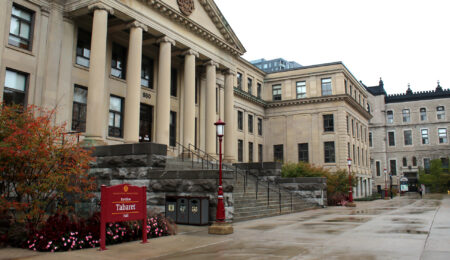Djilane hopes to address issues around affordable education, youth engagement
This interview is part of our series of articles profiling the Ottawa-Vanier candidates in the upcoming provincial byelection on Feb. 27. Each candidate was asked the same set of questions for consistency. Answers have been edited for length and clarity.
The Fulcrum: What do you feel your strongest quality or skill would be as an MPP?
Myriam Djilane: I think that my strongest skills are not necessarily skills that you think of when you’re thinking of politicians. I think that they would be things like honesty, empathy, and genuineness, but also genuine care for this area.
F: How do your background and past experiences make you qualified to be an MPP?
MD: I studied social work at Carleton University. I also applied to the University of Ottawa, and I just got a larger scholarship at Carleton, but I definitely would have gone to the U of O. My mom is francophone and French is my first language, so I definitely would have really appreciated going to a school where I could do my work in French also. Then I studied theatre at George Brown College in Toronto and acting for film and television at the Toronto Film School in Toronto.
But I think what experiences qualify me is, first off, this is my home. From one end of the riding to another, I have ties to the community. I was raised in Sandy Hill. I came back from Toronto because I thought Ottawa was a better place to settle down and was also significantly more affordable as a young person. So now I live in Lowertown. I have family and friends in Overbrook, in Beacon Hill, in Menlo Park so it genuinely is my home, which I think is something that’s very important because it makes you care more when it’s something that means a lot to you.
I think overall I also have a very diverse work experience, which has made me very adaptable. I also speak a lot of languages. I believe it’s a Nelson Mandela quote, “If you talk to a man in a language he understands, that goes to his head. If you talk to him in his language, that goes to his heart.” So I think there’s something very special about knowing a lot of languages.
I also am not a career politician. I think there’s something very valuable in that, that you’re not stuck in this politician or political bubble. I think it gives you a very open type of perspective going into politics, because at the core of it, what an MPP is is a person who is there to represent their constituents, and I think my life experience has been mirrored in the life experience of many of the people who live here.
F: Why did you choose to run under your party? Why should voters support your party?
MD: I think the NDP is genuinely a party for the people. I’ve always, as long as I’ve been able to vote, I’ve always supported the NDP because I think at the core its values align with my own. If you take a look at the platform it’s a lot of things that are just and fair, and it’s about creating a better society. It’s about creating a fair chance for every Ontarian.
F: How do you plan on using provincial powers to benefit people in Ottawa-Vanier?
MD: Well, I think there are a few key issues in Ottawa-Vanier. The first one is affordable housing. I was actually just at the Sandy Hill community association, which I believe is Action Sandy Hill, and it was great to be able to sit in on their meeting and hear what the concerns were. They talked a lot about affordable housing and they talked about how, even for the students who live in Sandy Hill, it’s not really affordable, considering you pay $600 or $700 for a bachelor apartment that you’re sharing with three other people. That might sound cheaper but it’s not affordable, it’s not a good way to live. Just because you’re young doesn’t mean you have to live in harsh conditions. So I think that’s a big one. Something else I would like to see change in Ottawa-Vanier is we have a large homeless population, and I think we need to start addressing the source of homelessness and not the symptoms.
We need better access to mental health services, and we often talk about a better health care system overall, but I think we need to have a big focus on mental health services. Knowing people who go to the U of O even, having better mental health services at the university, and then affordable housing also kind of goes hand in hand with that. If you have better access to affordable housing, then you’re addressing the homelessness issue.
I think I also would like to see some push back against our current government’s cuts on education and I’m looking forward to having the opportunity to go to Queen’s Park and push back on those cuts, because the only people who are losing out here are children, as well as education staff. I’ve had the opportunity to go to a few picket lines already with different school boards and I’m looking forward to going to some more. But I also hope that there are no more picket signs because I would like to see those issues addressed. My cousin is actually a Grade 6 teacher just around the corner from here, at Francojeunesse Public School, and hearing her speak about the actual realities of what those cuts look like in the classroom is difficult and it definitely makes me want to fight harder against our current government.
Tackling the long wait times at hospitals is important too. We often talk about ending hallway medicine but I think how you actually describe that in real terms is really ending long wait times in hospitals. My niece was at the hospital last weekend and she was asked by her doctor to be at the hospital, and they told her she was going to be admitted because she needed to be there. She was in the emergency room for three days. I went to see her all three days and she was in a corner in a conference room, it said conference room outside, because that’s where they put the overflow of patients, and it took three days for her to actually get admitted to a room. We pride ourselves and our health care system around the world, and that’s not acceptable, people shouldn’t be waiting that long. I’ve heard lots of stories from people, just door knocking and chatting with people on their doorsteps. Lots of people have incredibly long wait times for really necessary tests. I really want to be able to tackle that.
F: How will your plans address issues that affect young people and students, who make up a sizable chunk of the riding?
MD: So, I think we’re they were very privileged in this riding to have two major student populations. We also have Carleton students, I was a Carleton student and I lived in Sandy Hill.
But we have a lot of U of O students here, and we have La Cité students as well. From chatting with students – I went door-knocking at U of O residences a couple of days ago – I see that there’s either a lot of hope or a lot of defeat. It’s either people are really frustrated by how things are going, or people are really hopeful. It’s really nice to see youth engaging in politics, and even if they’re not necessarily willing to engage they’re willing to listen. I think one of the issues that I’ve heard the most from a few people is how OSAP cuts are affecting them. You should never have to choose between going to school and furthering your education and wanting better for your life, or paying your bills. You shouldn’t have to dig yourself into a hole of debt before you even enter the workforce, right? That’s not how we encourage our youth to build our country, by bringing them down before we can bring them up.
I’ve heard from a few people who’ve been affected by the fact that some grants are being turned into loans. I’ve heard of a few people who receive a letter, and then all of sudden their $5,000 in grants have now been turned into loans, and they’re going to be having to be paying them for a long time. I finished school three years ago, so I’m still in plenty of debt, and it’s a shame that I have to think about that for the next 10 to 15 years. t gives such a disadvantage to you. So I think that’s probably something that I’m really looking forward to tackling, especially considering talking about youth, affordable housing. Going back to that one, it’s so important because not even necessarily just while you’re in school, but when you get out of school, and you want to settle down and you want to, you know, maybe at some point own something that’s your own, and that’s not really a reality that faces the majority of young people nowadays.
F: What is the biggest issue impacting people in Ottawa-Vanier, and how do you plan to address it?
MD: Honestly, what I can tell you from going from one end of this riding to another, I think affordable housing is a really really really big one, whether you live in Beacon Hills, close to Montreal Road or the Montreal Road highway exit, or whether you live downtown, or you live in residence. A lot of people have a lot of concerns about how they’re going to be able to stay here. I chatted with a lady yesterday who lived in an Ottawa housing building and she was telling us that luckily right now she is healthy, and she is able, so she’s able to stay where she is. But one day she’s going to not be able to stay there anymore, in terms of her health, because it’s not really near any grocery stores, it’s not near any amenities. So, at some point, her age and her health will impact her. She was saying, “I’m probably going to have to move out of Ottawa, because I’m getting slowly pushed out of the city, because I won’t be able to afford to live here anymore.” She was born and raised here, I’d say she was maybe in her 60s. So she’s lived here a long time, and the fact that she has to be pushed out of her home because she can’t afford to live here anymore is not acceptable.
F: Any final statements?
M: Two things come to mind right now when I think about why I’m running.
One is because I think as a young person myself, in my mid to late 20s, I think you don’t get taken as seriously as other politicians. I’ve been told many times at people’s doorsteps, “Oh, but you’re so young,” and I’m like, yeah, that’s an advantage, and isn’t it great to see young people get involved in politics? It’s our future that is at stake, and we’re letting other people make decisions on our path, and we’re being passive about it.
I think also one of the main reasons that youth are not involved in politics is because we’re not very represented. You get exceptions here and there, and we talk a lot about those exceptions, like Mumilaaq, the MP from Nunavut. But I think we need to see more young people involved in politics, because that’s how you get other youth to get involved in politics, by showing them that they can do it. I think it’s also important to have age representation, but I think we also need to show young women, and young women of colour, that however many barriers there are, there are people who have done it. And the more people that they see, the more encouraging it is.
Read More:
- Green Party candidate for Ottawa-Vanier byelection focusing on improving transit, housing
- Liberal candidate for Ottawa-Vanier byelection looks to prioritize voices of youth
- PC candidate for Ottawa-Vanier byelection says he’ll bring better representation to riding





